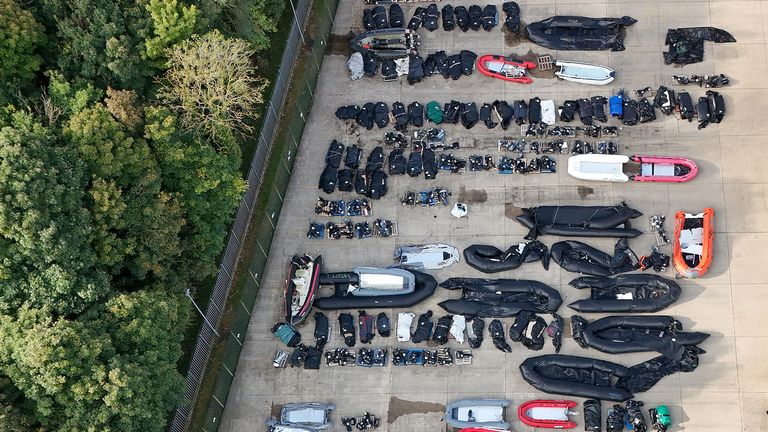So can you stop people smugglers by lumbering them with sanctions? That is the government’s latest idea, and it is bold and innovative.
It will certainly get attention, even if that doesn’t mean it will work. But it is another effort by this government to differentiate itself from the leaders who came before.
In a nutshell, the idea is to cut the financing to what the Foreign Office refers to as “organised immigration networks” and is intended to deter “smugglers from profiting off the trafficking of innocent people”.
So far, so convincing. The rhetoric is good. The reality may be more difficult.
For one thing, and we await actual details of what’s going to be done, this raises an enormous question of how this can be accomplished.
Some of the people smugglers bringing people across the Channel are based in Britain, but most aren’t. And as a general rule, they’re quite hard to track down.
I know that, because I’ve met some of them.
In Kurdistan, I drank tea with a cheerful man, Karwan, who had been responsible for smuggling a thousand people into Europe.
He had absolutely no fear of being caught, and no sense that he was even breaking the law.
Instead, Karwan considered that he was doing a duty to Kurds, allowing them to escape from the hardship of their nation to a more prosperous life in other countries, including Britain. Or, at least, that’s what he said.
How exactly Britain could impose sanctions on him is hard to imagine.
Nor is it hard to think of fear now creeping into the minds of the various smugglers I’ve met during years of reporting from the beaches of northern France.
These people are well aware that they’re breaking the law. You can hardly spend your time dodging French police and claim to be innocent.
Guns are becoming more commonplace in migrant camps. The spectre of sanctions won’t stop them.
So the question is whether the British government can track down the people at the very top of these organisations and find a way of levying financial sanctions that bite.
Presumably, if these people were in Britain, they’d be arrested, with the prospect of their assets being frozen.
So imposing sanctions will probably involve working alongside European countries, coordinating action and sharing information. A process that has become more complicated since Brexit.
Sanctions have previously worked well when targeted towards high-profile people and organisations with a clear track record.
Read more from Sky News:
Why does Trump want to buy Greenland?
Why are there wildfires in January?
The oligarchs who have propped up Vladimir Putin’s regime, for instance, or companies trying to procure armaments for hostile states. All have been targeted by a coalition of nations.
But this idea is novel – unilateral for a start, even if, one assumes, the French, Germans, Belgians and others have been warned in advance.
It’s also not quite clear how it will work – organised crime is famously flexible and if you successfully sanction one person, then someone else is likely to take over.
As for levying sanctions on the smuggling leaders in Iraq, Syria, Libya, Egypt, Albania and beyond – well, good luck.
What it does is to draw that distinction between the recent past, when the Rwanda plan was the main ambition, and Keir Starmer’s reliance on focusing on criminality and working together with partners.
And one other note. For years, the government has talked about people crossing the Channel as illegal migrants, even though there is a dispute between UK and international law about whether these people are actually breaking the law.
Now the Foreign Office is using the term “irregular migration”. Is this a change of tone, or just a stylistic whim? Just as with the sanctions, we will wait and see.
The post Plan to sanction people smuggling gangs is a bold and novel departure – but can the government make it bite? | UK News appeared first on World Online.

